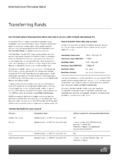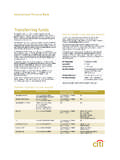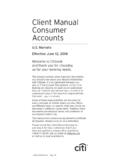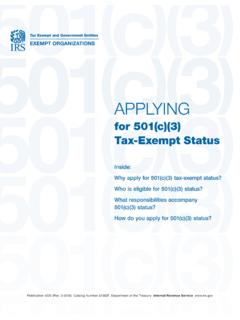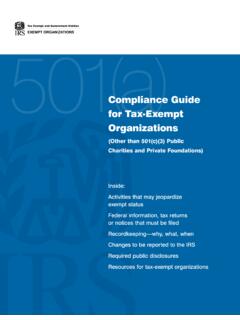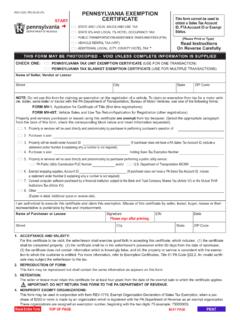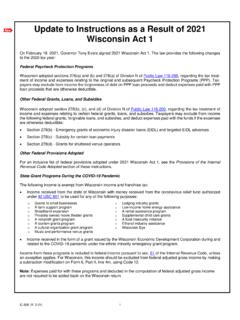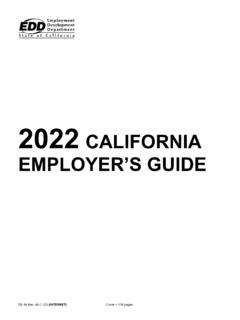Transcription of FATCA – The Foreign Account Tax Compliance Act
1 FATCA The Foreign Account Tax Compliance ActJuly 2012 July 2012 Table of Diligence73 Withholding You Need to Take Away From This Session Increase your understanding of FATCA regulation and policy changes. The principles of FATCAThe principles of FATCA The four pillars of FATCA Classification Due Diligence Due Diligence Withholding ReportingWh i it d? Who is impacted?11. ClassificationObjective of FATCA FATCA s objective is to uncover US tax evaders who invest directly in off-shore accounts or indirectly through ownership of Foreign entities To reach this goal, FATCA will require Foreign financial institutions (FFIs) to provide information to the IRS on US accounts. In addition, passive non-financial Foreign entities (NFFEs) will be required to provide information on substantial US owners to withholding agents To enforce Compliance , a 30% withholding tax will be imposed on certain payments made to FFIs and NFFEs th t f il tk thi d di lthat fail to make the required disclosuresFFIsUSFIsDDiliWithh ldiRtiUSFIsDue DiligenceWithholdingReporting2 ClassificationForeign Financial Institutions (FFIs) An FFI is any non-US entity ( created or organised outside the US) that falls into one of the following categories Accepts deposits in the ordinary course of a banking or similar business ( a bank)
2 Holds, as a substantial part of its business, financial assets for the Account of others ( a custodian)Idhld it lf t bidi th b ifitiitit di i fiil Is engaged, or holds itself out as being engaged, in the business of investing, reinvesting, or trading in financial instruments, including derivative contracts ( mutual funds, hedge funds, private equity funds) An insurance company that issues annuities or cash value insurance policies Observation: This definition is very broad and covers types entities that are not traditionally considered yypyfinancial institutions An FFI will suffer a 30% withholding tax on certain types of payments, unless it enters into an agreement with the IRS to perform certain due diligence, withholding and reporting obligations Participating FFI An FFI choosing to enter into an FFI agreement with IRS and exempt from FATCA withholding Non-participating FFI An FFI choosing not to enter into an FFI agreement with IRS and subject toFATCA withholdingFATCA withholding Observation.
3 The Qualified Intermediary (QI) agreement will be amended to require a QI to agree to become a PFFI and meet the obligations set forth in the FFI agreement3 ClassificationTypes of Compliant FFIs Participating FFI Enters into an FFI Agreement with IRS Registration period starts 1 January 2013 FFI Agreements first become effective 1 July 2013 Deemed compliant Registered FFI Must register with IRS along with the rest of the expanded affiliated group of FFIs Local FFI Non-reporting member Qualified collective investment vehicle Restricted fund Deemed Compliant Certified FFI May self-certify their status on a Form W-8 without registering with the IRS Non-registering local bank Retirement fund Non-profit organisation FFI
4 With only low-value accounts Owner-documented FFI Withholding agent does the reporting Excepted FFI ( Foreign governments) Not subject to withholding4 ClassificationFFI Agreements FFI Agreements are effective on or after 1 July 2013 PFFI must adopt written policies and procedures regarding due diligence processes PFFI must conduct periodic internal reviews of its Compliance with these policies and procedures and its FATCA obligationsFATCA obligations Observation: US tax authorities will not require mandatory external audits of PFFIsWithin 1 Year of FFI AgreementWithin 2 Years of FFI Agreement Complete review of all high-value accounts, including the relationship manager query Complete review of individual accounts notpreviously identified as US accounts and obtain necessary documentationnecessary documentation Perform the requisite review and obtain documentation for all prima facie FFIs Form W-8 IMY on file indicates FE is a QI or NQI Complete review of pre-existing entity accounts not previously identified as a prima facie FFIs Complete a responsible officer certification stating Review of all high-value individual accounts iscomplete Complete a responsible officer certification stating PFFI has completed the Account identification procedures and documentation requirements foriscomplete There were no formal or informal
5 Procedures in place from 6 August 2011, on to assist Account holders in avoidance of Chapter 4 provisionsprocedures and documentation requirements for all financial accounts that are pre-existing obligations, or if not, that it treats the accounts in accordance with the requirements as outlined in the FFI AgreementFFI Agreement5 ClassificationWithholding Agents A withholding agent is any person, US or Foreign , that has control, receipt or custody of a Withholdable Payment Withholding agents are required toiClif thbll tidif idt tidddililib d b th the payees by collecting and verifying documentation under due diligence rules prescribed by the on Withholdable Payments where documentation is missing, invalid or information returns with the IRS Withholding: 30% FATCA withholding can apply to A Non-participating FFI ( NPFFI ) An NFFE that fails to identify its substantial US owners, unless an exception applies.
6 Exceptions are provided for NFFE s deemed to represent a low risk of US tax evasion ( publicly traded companies or affiliates of publicly traded companies, Foreign governments, and active trades or businesses) f( ) A Recalcitrant Account holder of a participating FFI ( PFFI ) Any person refusing to supply identifying information relevant to their FATCA status; or Any identified US person that does not waive any local legal restrictions on reporting relevant information to th IRSthe IRS USFIs are not required to treat undocumented individuals as recalcitrant under FATCA because 28% backup withholding applies instead6 Classification2. Due Diligence FATCA Compliance and ImpactCritical Distinction USFIs and PFFIs must adopt written policies and procedures regarding due diligence processes for bothpre-existing and new accounts For USFIs, new Account procedures should be in place by 1/1/2013 For PFFIs new Account procedures should be in place by 7/1/2013 or later effective date of the For PFFIs, new Account procedures should be in place by 7/1/2013 or later effective date of the FFI agreement For off-shore accounts and pre-existing accounts, the rules try to minimise the amount of new information and documentation that will be needed from Account holders, relying instead on information and documentation.
7 Ygpreviously provided (for under local AML / KYC rules) In some cases, financial institutions will need to collect additional information and documentation to make the necessary FATCA classifications USFIs and PFFIs must review customer information for indicia, or indicators, of US status and request documentation from an Account holder if one or more indicia of US ownership are found7 Due DiligenceAccount DistinctionsIndirect US Accounts An Account held by a US owned non-financial Foreign entity is a US accountDirect US Accounts A direct Account maintained by an Account holder that is a specified US Person Whether held at an FFI or a USFI A US owned NFFE is a passive Foreign entity that has one or more substantial US owners Excepted US persons Publicly traded corporations or affiliates Tax-exempt organisations and IRAs Substantial ownership means More than 10% of a corporation s stock.
8 A profit or capital interest in a partnership or a beneficial interest in a Foreign trust Federal, state or local government oran instrumentality Banks, dealers in securities, commodities orderivativesinterest in a Foreign trust Any portion of a Foreign trust that is classified as a grantor trust and is taxable to a US grantor In contrast most know your customer ( KYC )orderivatives Real Estate Investment Trusts (REITs) Regulated Investment Companies (RICs) Common trust funds and charitable trusts In contrast, most know your customer ( KYC ) regimes require identification of owners of a minimum of a 25% interest in privately held entities8 Due DiligenceAccount Distinctions (Cont d)Off-shore vs. On-shore Obligations Off-shore Obligation Any Account , instrument, or contract maintained Individual vs.
9 Entity Account Entity Anyone other than a natural person. Includes corporations, partnerships, trusts, estatesand executed at an office or branch of the withholding agent at any location outside of the US For any payment made or sale effected outside of Financial Institutions USFIs FFIs Participating, Non-Participating, Deemed yp ythe US with respect to an off-shore obligation USFIs and FFIs can rely on documentary evidence or written statements to establish Foreign statusCompliant, Excepted, Owner Documented, Territory Organised Non-Financial Entitiesforeign status If there are any US indicia, additional documentation must be obtained to substantiate Foreign status Non-financial US entity Non-financial Foreign entity (NFFE)
10 Active, Passive, Excepted, Territory Organised Form W-9 must be used to establish US status On-shore obligations Forms W-8 must be collected to establish Individuals US Person Foreign Person Recalcitrantforeign status If there are any US indicia, additional documentation must be collected to substantiate claims of Foreign status Recalcitrantg9 Due DiligenceAccount Distinctions (Cont d)Pre-existing Obligations Transition rule for 2014 same as for USFIs Unless a PFFI elects otherwise, it is not required to Pre-existing Obligations USFIs Pre-existing obligations are accounts opened or contracts entered into prior to January2013document a pre-existing Account if No Account holder has previously been documented as a specified US Person, and The aggregate balance or value of the accountJanuary2013 USFIs must determine the FATCA status of all pre-existing entity accounts However, no due diligence is prescribed for The aggregate balance or value of the Account and any related accounts is US$50,000 or less for individuals or US$250.




